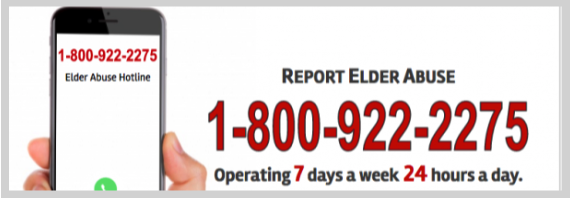Elder Abuse
Research has shown as many as one out of 10 seniors 60 or older who live independently have experienced some form of abuse according to a survey of 5,777 seniors (2010 National Elder Mistreatment Study). This includes financial abuse which is addressed in the next section.
Reporting Elder Abuse
In Massachusetts the Executive Office of Elder Affairs is charged with administering a state-wide system to receive and investigate reports of elder abuse. Protective Services (PS) are in each of the 22 Elder Services (ES) agencies in Mass., and ours local office is Elder Services of Cape Cod and the Islands which covers the Cape, Nantucket and Martha's Vineyard.
Who can Report
Anyone can call and report elder abuse using the statewide hotline (1-800-922-2275) 24 hours per day, seven days per week. The reporter's identify is kept secret, and reporters are given immunity from any civil or criminal liability as long as the reporter did not commit the abuse and the report was made in good faith.

Many professionals (Physicians, physician assistants, nurses, medical interns, coroners, dentists, podiatrists, osteopaths, social workers, occupational & physical therapists, psychologists, family counselors, police, probation officers, EMTs, firefighters director of a home health aide agency, director of a homemaker agency, director of an assisted living residence, case managers, health aides, homemakers, director of a Council on Aging, Council on Aging outreach workers) are "mandated" to report elder abuse they learn of or face a $1000 fine. They must call and report abuse and fill out an Elder Abuse Mandated Reporter Form within 48 hours of learning of it.
What Happens?
Once a report of abuse is received a local agency PS casework investigates the allegations. If the investigation substantiates abuse, the elder is offered options to address the situation; e.g., if self-neglect is found, the senior might be offered assistance with getting help in their home. Any elder who has the capacity to make informed decisions can refuse services, but if a caseworker is suspicious of their capacity s/he will seek information from the elder's family and doctor and discuss it with ES supervisors and possibly ask for a neurocognitive assessment. In some cases, with a recalcitrant senior who appears at risk, a court order is obtained to force the senior to undergo the evaluation.
This writer has done many such cases on the Cape and Islands, but he (and ES) always seeks to avoid a court order if at all possible. Ultimately, based on the evaluation a Medical Certificate for guardianship and/or conservatorship may be completed taking decision-making out of the senior's hands entirely. This can lead to placements in assisted living or even nursing home settings. ES strives to find the least restrictive set of services possible. Learn more about Cape Cod's services here. They found a 37% increase in the number of reported abuse cases (24,978) in 2015 as compared to 2011, with well over half or all cases being confirmed.
The police are often involved in an ES investigation, and ES is mandated to report cases involving criminal behavior to the district attorney. Still, this writer is constantly amazed at how often the local DA passes on investigating cases where a neighbor convinces a demented senior to deed over a $350,000+ home. They state it is a "civil" matter and defer, which removes a good deal of leverage ES could use to reverse the damages; i.e., trade the perpetrator time in prison for giving back the house. Yet that same DA will go after a theft of $50 on the streets of Hyannis.
Next Page –>